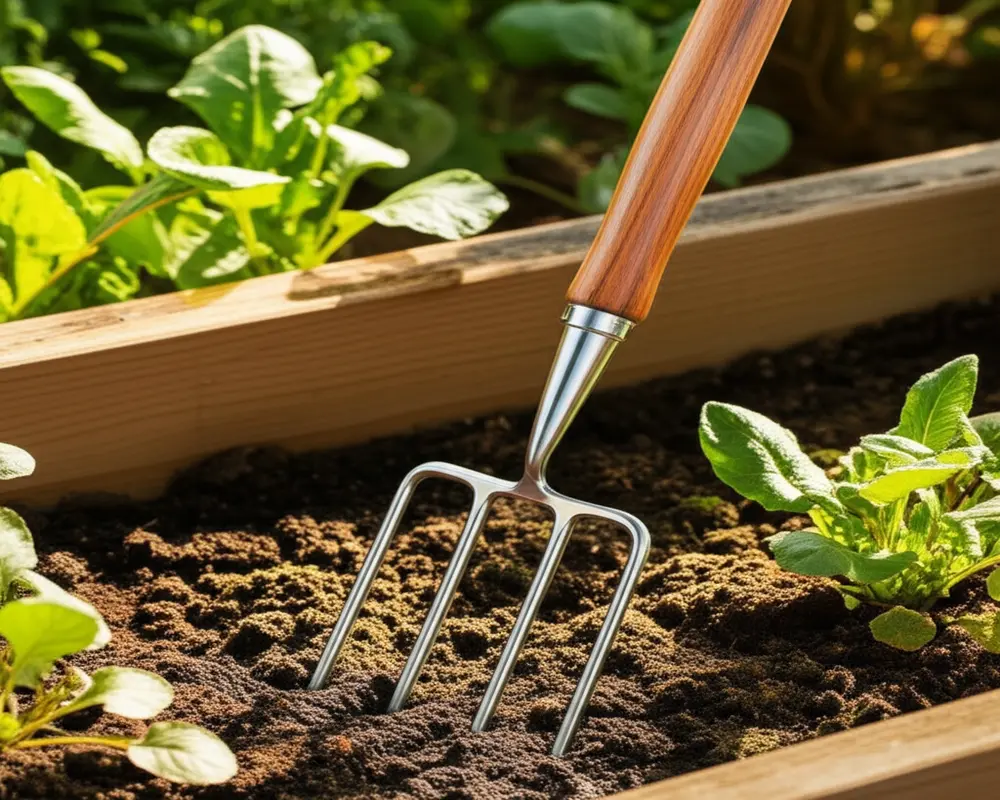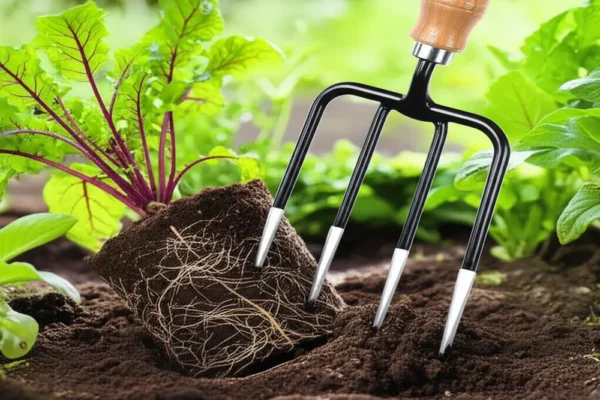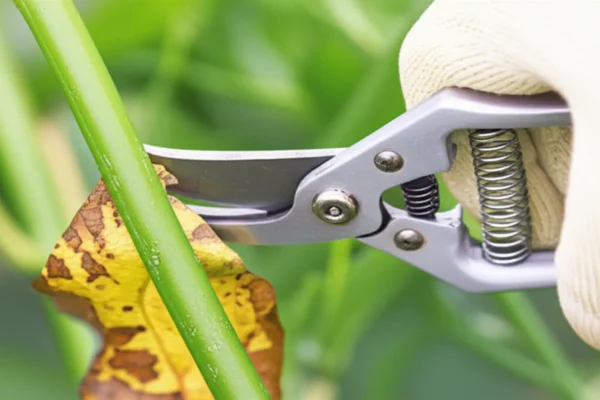Garden Fork for Raised Beds: Choosing & Using the Best Tool
Discover how to select and use the ideal garden fork for raised beds to enhance soil health and streamline gardening in confined spaces. This comprehensive guide offers expert insights on the best garden fork types, usage techniques, and maintenance tips to help you cultivate vigorous plants with less effort.
1. Introduction: Importance of Using a Garden Fork for Raised Beds
Raised bed gardening presents unique challenges compared to traditional in-ground planting. The confined space and limited soil volume require specialized tools to maintain soil health effectively. Regular garden forks often prove cumbersome in tight beds and may inadvertently damage the bed structure or compact soil, defeating their purpose.
A garden fork designed for raised beds addresses these challenges by providing ergonomic benefits and precision soil management suited to the smaller scale and depth of raised beds. In this article, you’ll learn how to choose the perfect garden fork based on handle length, tine design, and material quality. We will also explore effective usage techniques and essential maintenance practices that ensure longevity and performance of your garden fork.
2. Challenges of Using Standard Garden Forks in Raised Beds
2.1 Soil Compaction Problems
Standard garden forks often have long tines and wide heads that are excellent for open soil but can cause soil compaction inside raised beds. Compacting soil hampers root growth and reduces water penetration, ultimately affecting plant health.
2.2 Maneuverability Limits in Confined Spaces
Raised beds are typically narrow, restricting movement. Full-sized forks may be difficult to maneuver without disturbing plants or bed edges, making gardening laborious and inefficient.
2.3 Physical Effort and Ergonomic Strains
Using a traditional garden fork can require excessive bending or twisting, leading to increased physical strain. Ergonomics are crucial to avoid fatigue, especially when working in smaller, confined gardening areas.
2.4 Potential Damage to Raised Bed Structures
Heavy or wide garden forks risk damaging wooden or metal bed frames when used in tight quarters. Choosing a tool that respects the structure’s integrity prolongs the bed’s lifespan.
3. Features to Look for in a Garden Fork for Raised Beds
When selecting a garden fork specifically for raised beds, focus on these key aspects to ensure you have an effective, comfortable tool.
3.1 Handle Length: Ideal Shorter Handles
Shorter handles, typically between 18 to 24 inches, provide better control and reduce strain in confined beds. They allow gardeners to work without bending excessively while maintaining precision.
3.2 Head Design: Narrow and Compact Heads for Precision
A narrow head with closely spaced tines fits easily between plants and bed edges, allowing targeted soil work without disturbing nearby roots or bed materials.
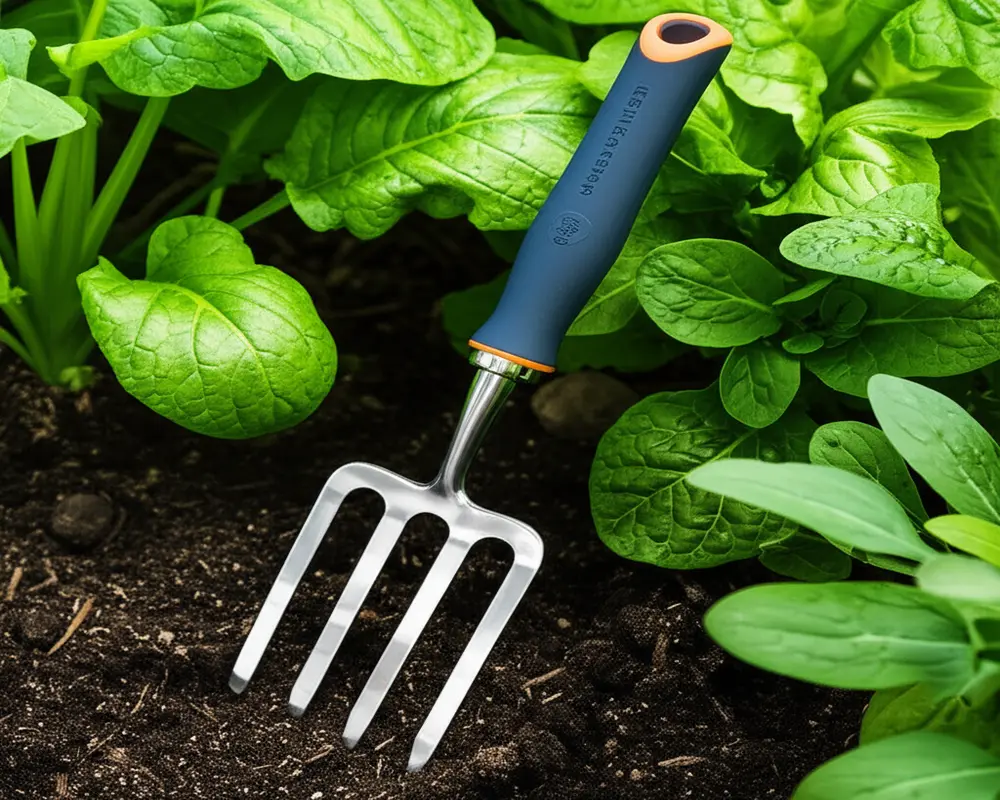
3.3 Tine Length and Shape: Matching Raised Bed Depth and Task
Tines around 4 to 6 inches long are ideal to match the typical depth of raised beds, enabling effective soil aeration without penetrating too deep. Straight or slightly curved tines work well for loosening soil and removing weeds.
3.4 Weight and Balance: Lightweight Durable Materials
Choose a garden fork made from lightweight yet durable materials such as carbon or stainless steel. Balanced tools minimize effort, making extended gardening sessions comfortable.
3.5 Material Quality: Steel Types and Handle Materials
The fork head should be forged steel for strength and rust resistance. Handles made from hardwood or fiberglass offer durability with shock absorption, enhancing user comfort.
4. Different Types of Garden Forks Suitable for Raised Beds
4.1 Border Forks: Compact and Versatile
Border forks are smaller than standard garden forks, perfect for working along edges in raised beds. Their narrow design makes them versatile for tasks like soil turning and weed removal.
4.2 Mini Digging Forks: Best for Small Beds
Mini digging forks have short handles and tines, ideal for small raised beds or container gardens where precision is key.
4.3 Mini Broadforks: No-Dig Aeration Tool
Broadforks have wide heads with long tines designed to aerate soil without turning it over. Mini versions are excellent for aerating raised beds deeply but gently.
4.4 Hand and Cultivator Forks: Precision for Small Areas
These hand-held tools are perfect for fine soil cultivation, especially in narrow rows or close to plant stems, where larger tools can’t reach.
5. Top Garden Fork Recommendations for Raised Beds
Here are some of the best garden forks designed for raised beds, balancing quality, ergonomics, and price.
| Model | Handle Length | Head Width | Material | Price Range | Pros | Cons |
|---|---|---|---|---|---|---|
| Compact Raised Bed Fork X1 | 20 inches | 4 inches | Stainless Steel & Hardwood Handle | $35 – $45 | Lightweight, durable, great for precision work | Handle may be short for taller gardeners |
| Mini Broadfork Pro | 24 inches | 10 inches | Carbon Steel & Fiberglass Handle | $55 – $70 | Excellent soil aeration without digging, sturdy design | Heavier than mini digging forks |
| Border Fork Deluxe | 22 inches | 5 inches | Forged Steel & Fiberglass Handle | $40 – $55 | Versatile, ergonomic, rust-resistant | Limited availability online |
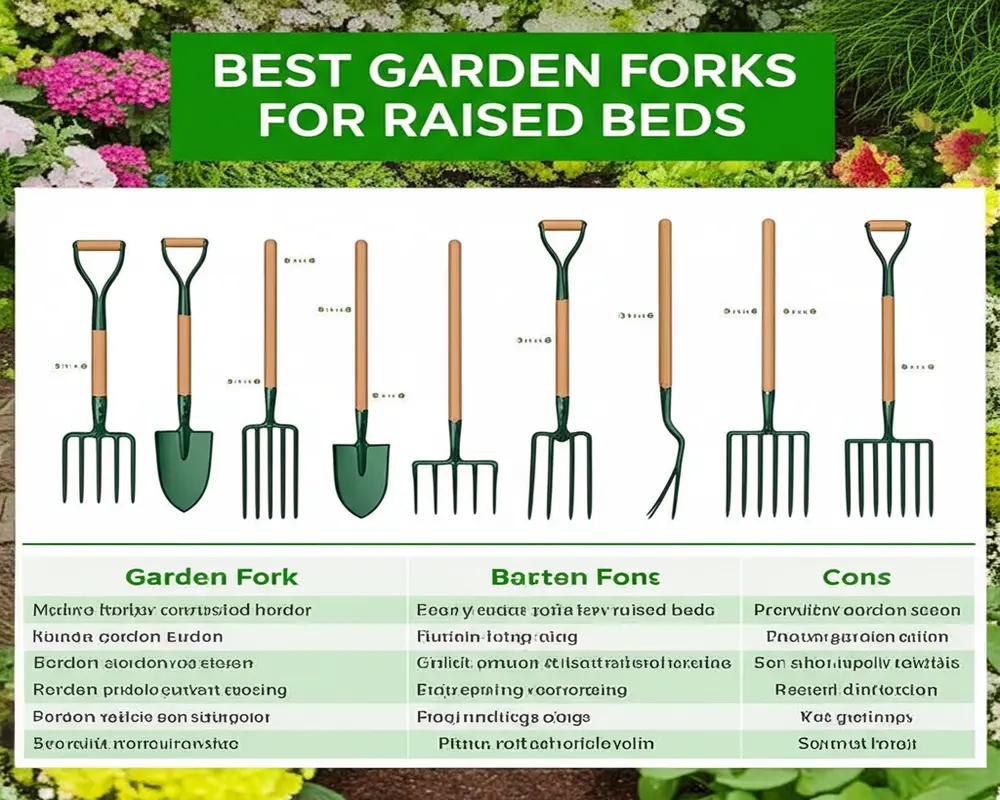
See more specifications and reviews on the detailed Choosing the Right Garden Fork.
6. How to Use a Garden Fork in Raised Beds Effectively
Effective use of a garden fork enhances soil aeration, promotes root development, and supports plant health. Here are expert tips to maximize its benefits.
6.1 Techniques for Gentle Soil Aeration
Insert the garden fork tines vertically into the soil around plants without disturbing roots, then gently rock back and forth to loosen compaction and increase air circulation.
6.2 Incorporating Soil Amendments
After loosening, sprinkle compost or other organic matter into the soil and use the fork to mix these amendments evenly, improving nutrient availability.
6.3 Weed Removal and Soil Loosening
Use the fork’s tines to pry out stubborn weeds, working carefully to avoid disrupting nearby crops.
6.4 Initial Soil Preparation and Breaking Clods
When preparing a new raised bed, use the fork to break large clods of soil thoroughly, enhancing texture and drainage.
6.5 Avoiding Soil Compaction Best Practices
Always avoid stomping or pressing the soil firmly after aeration. Use stepping boards to distribute weight when working in beds to prevent compacting loosened soil.
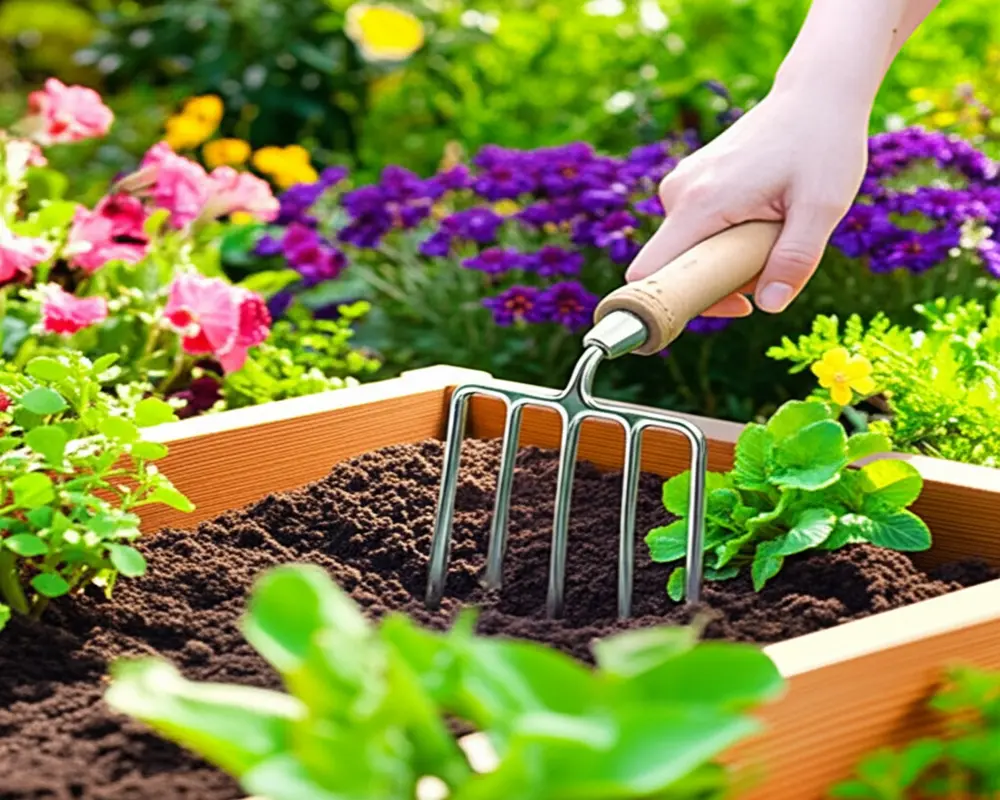
For a deeper understanding of soil aeration benefits, explore the Soil Aeration Importance guide.
7. Maintaining Your Garden Fork for Longevity
Proper care extends your garden fork’s life and keeps it performing optimally.
- Cleaning: Remove soil and plant debris after each use to prevent rust and maintain sharpness.
- Sharpening: Occasionally sharpen the tines for easier penetration, especially if the fork is used in compacted soil.
- Rust Prevention: Apply a light oil coating on metal parts during offseason storage.
- Handle Care: Inspect and sand wooden handles periodically; treat with linseed oil to avoid cracking.
Learn more on garden tool maintenance and best practices at Garden Tool Maintenance.
8. Complementary Tools for Raised Bed Gardening Success
In addition to a garden fork, several tools enhance efficiency and effectiveness in raised bed gardening:
- Hand Trowels: Precision planting and transplanting of seedlings.
- Cultivators: Loosen soil surface in tight spots.
- Hori-Hori Knives: Versatile for cutting, digging, and weeding.
- Soil Testers: Monitor pH and moisture levels to optimize soil conditions.
- Watering Wands: Reach plants carefully with gentle watering.
Incorporating these tools ensures a comprehensive approach to raised bed care.
9. Conclusion: Investing in the Right Garden Fork for Raised Beds
Choosing the right garden fork for raised beds is an investment in the health and productivity of your garden. Prioritizing ergonomic design, appropriate tine length, and durable materials results in less strain and better soil management. Utilizing the right techniques and maintaining your tool ensures a successful gardening experience year after year.
Equip yourself with a specialized garden fork tailored for raised beds to unlock the full potential of your growing space.
10. Frequently Asked Questions (FAQs)
- Can I use a regular pitchfork for raised beds?
- Regular pitchforks generally have longer, wider tines suited for bulk tasks like moving hay, not precise soil work in raised beds. A garden fork designed for raised beds with shorter, narrower tines is preferred to avoid soil compaction and bed damage.
- How often should I aerate soil in raised beds?
- Soil aeration frequency depends on soil type and crop demands but generally once or twice per growing season is sufficient. Over-aeration can disturb soil structure, so balance is key.
- What is the ideal handle length for garden forks in raised beds?
- Handles between 18 and 24 inches strike a good balance between leverage and maneuverability in raised beds, reducing ergonomic strain while allowing effective soil penetration.
- Are stainless steel garden forks advantageous?
- Yes, stainless steel offers corrosion resistance, durability, and long-lasting sharpness, making it an excellent choice for garden fork heads.
- Should I choose a broadfork or traditional garden fork for raised beds?
- Broadforks are excellent for deep, no-dig aeration in larger raised beds, while traditional or mini garden forks are better for smaller beds or precision tasks. The choice depends on bed size and gardening needs.
For more raised bed gardening techniques, visit Raised Bed Gardening Tips.
Explore our guides on related tools like Best Garden Spades for complementary gardening techniques.

